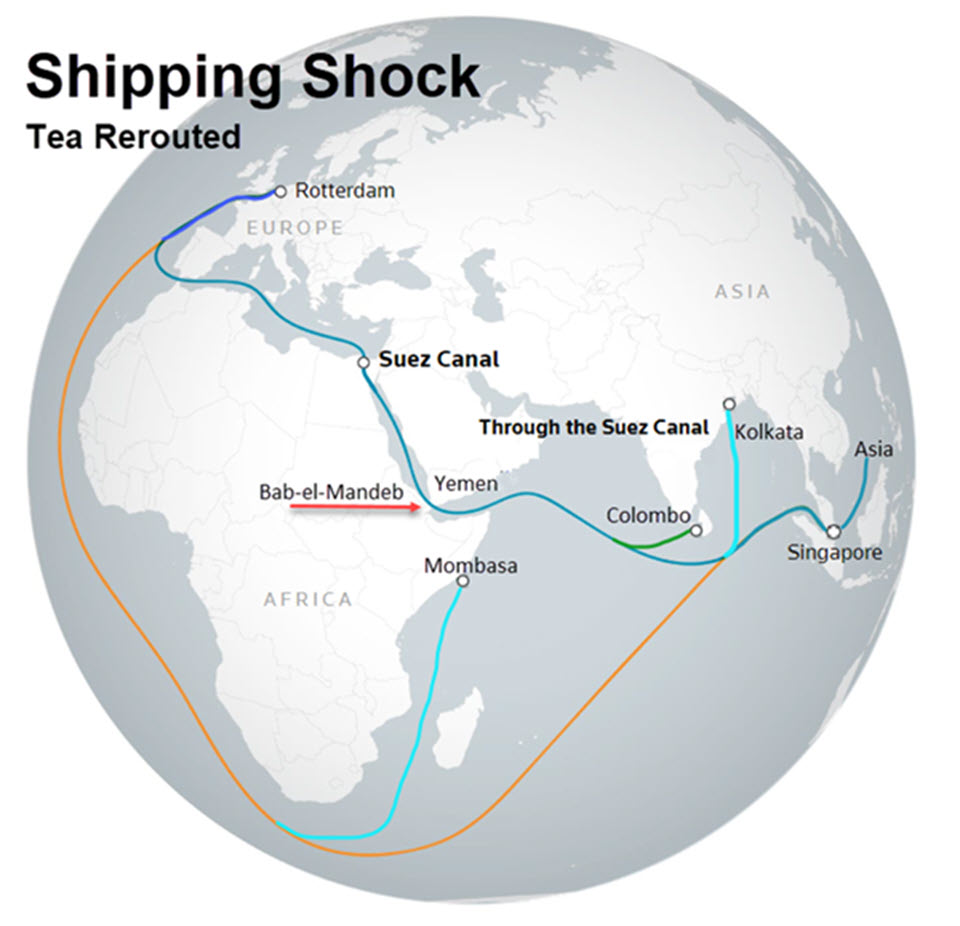Episode 150
Iran Tea Company CEO Implicated in $3.7 Billion Embezzlement Scandal | Shipping Shock: Missile Threat Diverts Suez-Bound Tea Cargo | Malawi Anticipates a Steep Decline in Tea Production
Tea News for the week ending Dec. 22
Featured
In 2023, the tea industry bid farewell to several notable figures. In this episode, we pay tribute to David C. Bigelow, Jr., an industry icon who died in June at 96. A member of the silent generation born in the roaring 20s, David was a World War II veteran and 1948 Yale University graduate who transformed the specialty tea segment. He steered a boutique tea blending business launched in his mother’s kitchen into a multi-million-dollar mass-market brand. Joining us today is David’s daughter Cindi, President and CEO of Connecticut-based and family-owned R.C. Bigelow, a $250 million B-Corp known for innovations that redefined tea service in restaurants and grew the company to become the US market leader in specialty tea.
Listen to the interview
Powered by RedCircle

Shipping Shock: Missile Threat Diverts Suez-Bound Tea Cargo
Houthi missile and drone attacks in the Red Sea are diverting ships laden with tea away from the industry’s primary access to Europe, costing time and money.
Passage through the 120-mile Suez Canal connecting Europe with Asia is one of the world’s most important maritime choke points. A shipping crisis unfolds at the southern strait called Bab-el-Mandeb (the gate of tears). Yemen-based insurgents have deployed hundreds of drones and fired the first anti-ship ballistic missile to strike a commercial vessel, Palatium III.
This week’s decision by all major shipping lines to bypass the Red Sea route will affect 53% of the global container trade. Dry bulk carriers, oil tankers, and smaller container ships will likely follow their lead. War risk insurance rates have spiked along with the price of oil. About 9.2 million barrels daily transit the canal, approximately 9% of global demand and 4% of the world’s liquid natural gas (LNG).
The US, UK, and French navies are providing escort with the USS Carney downing a swarm of 14 drones.
On Dec. 17, the Suez Canal Authority reported that 55 ships that were scheduled to transit the canal had been diverted. That same day, 77 ships passed through the canal, a much higher number than the 50-ship daily average.
Tea bound for the UK, Rotterdam, and German ports from the UAE, East Africa, and Asia will now travel approximately 11,169 nautical miles around Africa, compared to 6,436 via the Red Sea and Suez Canal. Adding transit days is costly. Operating a container ship costs between $25,000 and $85,000 per day, excluding fuel, which adds up to $130,000 daily. Transit from India to the UK vial the Suez Canal is usually 17 to 21 days. Alternate routes can take five to six weeks.
In 1869, when the eight-meter (26-foot) deep canal opened, the largest ship that could pass was 5,000 tons, but the cost of transportation and access to the Indian and Sri Lankan was far easier, making Suez a primary trade route for tea. Over 20,000 ships carrying approximately 12% of global trade each year pass through the Suez Canal, carrying 30% of all global container traffic and more than $1 trillion in goods yearly.

Iran Tea Company CEO Implicated in $3.7 Billion Embezzlement Scandal
By Dan Bolton
Akbar Rahimi, the CEO of Iran’s leading tea company, is under arrest, accused of a five-year embezzlement scheme that generated $3.37 billion in ill-gotten gain.
Privately held Debsh Agriculture and Industrial Group engaged in “large-scale financial malpractice” dating to the presidency of Hassan Rouhani in 2018, according to NCRI. The publication cited unnamed government sources.
“Several banks, institutions, and ministries, including the Ministry of Industry, the Ministry of Agriculture, the Customs Administration, the Central Bank, the Trade Development Organization, and the regime’s Food and Drug Organization, have been implicated in this widespread corruption scheme,” writes NCRI (National Council of Resistance of Iran).
Here is how it unfolded
Debsh Tea ordered grade 1 Darjeeling tea at $14 per kilogram to mislead resellers. In practice, it imported far greater quantities of tea from Kenya and seconds from Iran that sold for $2 per kilogram “with the Food and Drug Organization confirming the quality of the imported teas,” according to NCRI. Origins were falsified, and corrupt customs officials apparently looked away.
The company also bought domestically grown tea and “re-imported” it, masquerading as expensive foreign grades.
The tea was traded at the Central Bank’s official exchange rate, known as the “Nimaee-dollar,” which values US dollars at 37,000 tomans, “a rate accessible exclusively to traders affiliated with the regime,” according to NCRI. This compares to the market exchange rate, which hovers around 50,000 tomans per dollar [USD$1 equaled 42,340 IRR on 12/20/23]. “Consequently, each dollar contributes approximately 13,000 tomans to the coffers of the regime’s embezzlers. When multiplied by the billions of dollars received in foreign exchange, this translates to astronomical figures,” writes NCRI.
Iran’s General Inspection Organization noted a spike in the annual budget, which usually allocates around $300 million for tea imports. The government’s allocation for tea and tea processing equipment tripled in 2021, with $1.472 billion earmarked for machinery.
Imports totaled 110,000 metric tons, about double the usual amount – quantities sufficient to depress sales of domestically produced tea.
“Tea cultivators have suffered huge losses,” writes Maryam Shokrani with the state-run Sargh daily newspaper. Mohammad Sadegh Hassani, executive director of the Union of Northern Tea Factories, told NCRI the embezzlement scheme “upset the market balance, confronted the industry with a crisis, and led to the accumulation of a large volume of tea in warehouses.”
Akbar Rahimi is one of a group known colloquially in Iran as the “smuggling brothers,” who were implicated in another significant case related to irregularities in the import of paper at the Ministry of Culture and Islamic Guidance. The term “smuggling brothers” refers to organized groups exploiting state connections, particularly with the Revolutionary Guards, to conduct extensive trafficking to bypass international sanctions,” according to NCRI.
Judiciary spokesman Masoud Stayeshi, on Dec. 5, confirmed, “Various collaborations have been made with this company [Debsh], and a significant amount of foreign exchange and national resources have been allocated to this issue.” Other Islamic Republic officials implicated in the embezzlement include Javad Sadatinejad, the Minister of Agriculture, who resigned in April; governors of the Central Bank; chiefs of the Iranian Customs Administration, and others.
Iran International reported that Chief Justice Gholam-Hossein Mohseni-Eje said the government had dismissed 60 individuals in the case and later clarified the dismissals included those involved in non-related incidents during the past two years. Government spokesman Ali Bahadori Jahromi said earlier this week that several low and mid-ranking officials have been arrested over the case. According to Iran International, the company’s CEO, Akbar Rahimi, is reportedly under arrest. The court refused to name the suspected collaborators, several of whom are likely highly placed in the government of Supreme Leader Ali Khamenei.
Reformist newspaper Etemad writes that “the main problem is that, aside from a general headline, no details have been released.
Iran’s Inspection Organization revealed irregularities on Nov. 30. Besides the abovementioned embezzlement, Rahimi may have traded $1.4 billion in Iranian government-held foreign currency on the open market. The case against government bodies that had provided foreign currency for the firm is to be sent to the Public and Revolution Court of Tehran for certain violations, according to IFP News.
Share this post
Episode 148 | Iran Tea Company CEO Implicated in $3.7 Billion Embezzlement Scandal | Shipping Shock: Missile Threat Diverts Suez-Bound Tea Cargo | Malawi Anticipates a Steep Decline in Tea Production | PLUS Cindi Bigelow, President and CEO of R.C. Bigelow Tea pays tribute to her father David C. Bigelow, who passed in June at 96.

Episodes 1-49
Ep 50-96
Ep 97-148
Ep 149-150
Powered by RedCircle


